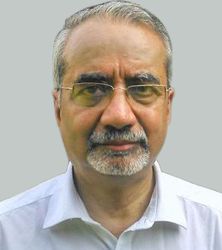
On October 16, 2015, a five-judge Constitution bench of the Supreme Court struck down the Constitution (99th Amendment) Act, 2014, that created the National Judicial Appointments Commission (NJAC) for appointing Supreme Court and High Court judges, by a majority of four to one. This verdict revived the collegium system with immediate effect.
The constitution of the NJAC had dealt a telling blow to the judiciary’s independence. The shadow of the law minister loomed large over the NJAC. The law minister presides as the head of India’s biggest litigant, the government. How can a litigant participate in a process to select judges of the Supreme Court and the High Court? I was a petitioner in person in this historic case, and thus had a chance to participate in the proceedings. The hearing went on during the summer vacation of 2015, spread over 32 days from 10:30am to 4pm. It was a legal battle at full throttle. Ultimately, the Supreme Court rose to the occasion and firmly protected the independence of the judiciary. The government lost.
It appears that the government has not been able to digest its defeat. Even 27 months after the NJAC verdict, the Memorandum of Procedure (MoP) for appointing judges has still not been finalised. In the NJAC verdict, the Supreme Court had clearly directed the government to finalise the MoP in consultation with the Chief Justice of India. Of course, the CJI and the other four senior judges in the collegium had to agree unanimously. Somehow, the MoP remains in cold storage. Instead of finalising the MoP, the government is attempting to usurp veto power in judicial appointments, in contravention of the NJAC verdict. The Supreme Court has so far exercised extreme restraint in not triggering its plenary powers along with contempt jurisdiction under articles 129, 141, and 144 of the Constitution. Thus, the stalemate continues, and this has been undermining the functioning of the judiciary. Appointment process of judges is being impeded and the backlog of cases is mounting. About 40 per cent of the posts in High Courts are vacant. Litigants have been the worst affected.
Amid this dismal situation, the four top judges in the Supreme Court have publicly voiced their concerns on the threat to the independence of the judiciary. The message from them is loud and clear: democracy is threatened. This is too serious a matter and every citizen in the country must now stand up to thwart the forces bent upon destroying India’s democracy. The press is already under attack. Independent journalists are being threatened. Now, it is the independence of the judiciary that is under severe attack. Is India marching towards a totalitarian regime?
Those playing havoc with the press and the judiciary would do well to remember that a young reporter for The Washington Post, Bob Woodward, had teamed up with another reporter Carl Bernstein in 1972, and had exposed the Watergate scandal in the US. President Richard Nixon had to resign. Let us also remember that a courageous judge from the Allahabad High Court, Justice Jagmohanlal Sinha, had invalidated the election of prime minister Indira Gandhi, who was declared guilty of corrupt practices. She was also disqualified from contesting elections for six years. The Emergency was then imposed on the nation. The rest is history. So, those playing around with the press and the judiciary could well face their Waterloo, unless they mend their ways.
India is witnessing an undeclared emergency. If the four top judges of the apex court of the [world’s] largest democracy have voiced their anguish before the nation, then the situation is alarming. The nation salutes these four judges who will go down in history for having fought valiantly to uphold the rule of law in India. Stand up, 1.3 billion Indians, let’s save our democracy!
The author is a senior Supreme Court advocate and former additional solicitor general of India.





